Japan’s national high-school soccer tournament is thriving after more than 100 years, attracting huge crowds, millions watching on TV and breeding future stars, despite professional clubs trying to attract young talent.
The annual tournament kicked off on Saturday and is still regarded as the pinnacle of amateur soccer with young players dreaming of playing in the final in front of tens of thousands at the National Stadium in Tokyo.
Matches are a massive occasion for the whole school as student cheering squads wave flags, bang drums and roar on their teams in a spectacle of noise and color.
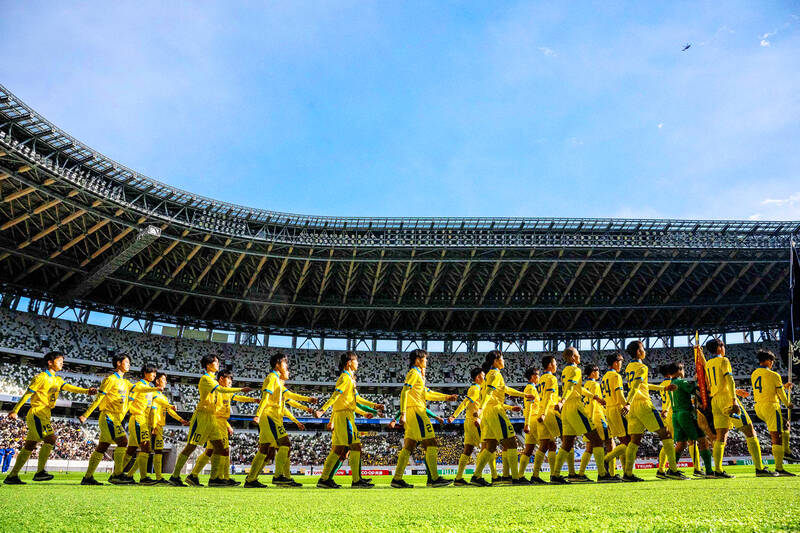
Photo: AFP
“All the teams are at a similar level of technical ability, so it’s about who wants to win the most,” said 18-year-old Junpei Fukuda, the leader of Ryutsukeizai University Kashiwa High School’s cheering squad.
“We want our voices to be the loudest,” Fukuda said.
Unlike in Europe, where young players are snapped up by professional club academies, high-school soccer in Japan still attracts elite talent.
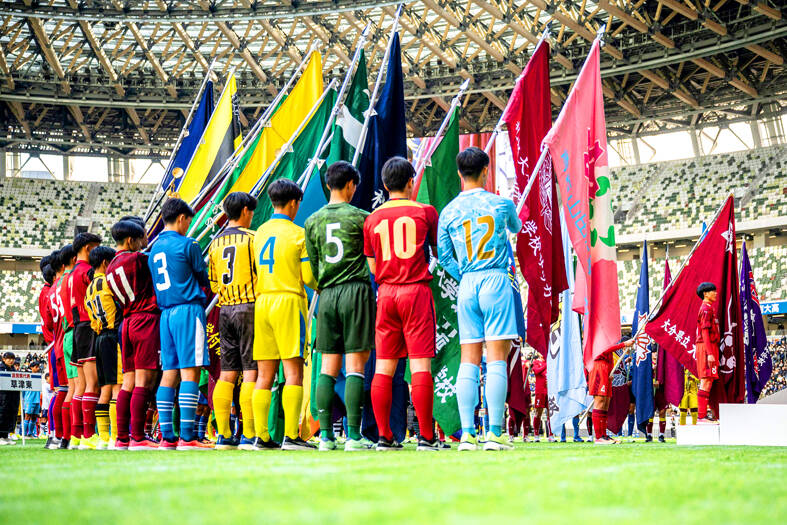
Photo: AFP
Many go on to the professional game and play for their country with Japan stars such as Daizen Maeda and Reo Hatate of Celtic, and Crystal Palace’s Daichi Kamada all having played high-school soccer.
The landscape has begun to change over the past few years, with more top young players turning their backs on the high-school game and joining the youth teams of top-flight J.League clubs instead.
The school tournament’s quality has taken a hit as a result, but its magic endures for many.
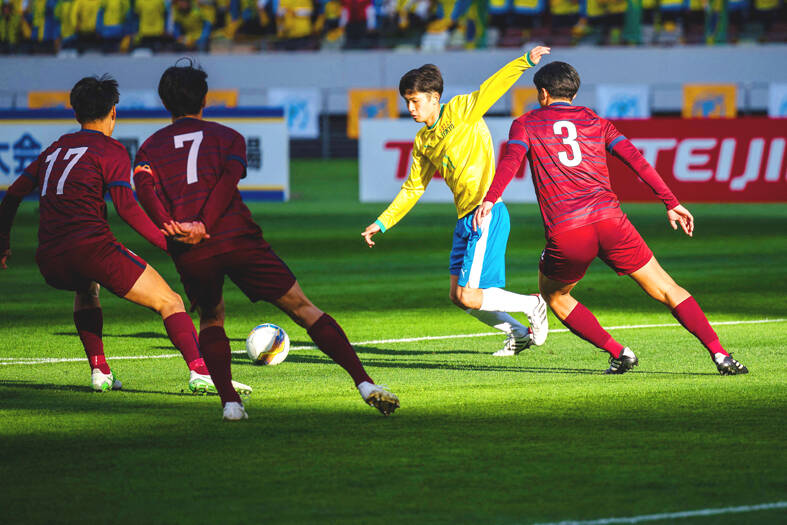
Photo: AFP
Ryutsukeizai Kashiwa midfielder Kanaru Matsumoto, who would turn professional with the J.League’s Shonan Bellmare next year, said the tournament was “the stage I’ve aspired to play on ever since I was little.”
“The main reason I came to this school was because I thought I could play at the national high-school tournament here,” the 17-year-old said.
The national high-school tournament was first played in 1917, long before professional soccer came to Japan with the J.League in 1993.
Teams from each of Japan’s 47 prefectures, with two from Tokyo, compete in a knockout competition over 18 days with matches played in and around the capital.
All games are televised locally and the semi-finals and final are broadcast to a national audience, with millions tuning in.
Last season’s final in Tokyo was played in front of 55,000 fans, comfortably eclipsing most J.League attendances.
High-school baseball and rugby tournaments are also popular and soccer journalist Masashi Tsuchiya said it was because school sports strike a chord in Japan.
“I’m from Gunma Prefecture and I always support the Gunma team, even if it isn’t my old high school’s team,” he said. “It’s a tournament that places importance on local pride and old school ties.”
Not all players who appear at the tournament have ambitions to play at the top level.
Some play on at university only, while others give up the sport after graduating from high school.
The tournament marks a transition after three years together as a team, Ryutsukeizai Kashiwa manager Masahiro Enomoto said.
“It’s where kids, who have worked really hard for something, become adults,” he said.
TV broadcasts of games go beyond events on the pitch, delving into the players’ back stories, playing up emotional bonds and featuring scenes of beaten teams in floods of tears.
“Japanese people love that kind of drama more than they think about the quality of the football,” even though the standard remains undoubtedly high, Enomoto said.
School sides still hold their own against J.League youth teams, who are increasingly regarded as a better route to the professional game.
The nationwide Prince Takamado Under-18 Premier League features a roughly even split of high school and J.League youth teams, and Ohzu High School were crowned this year’s champions.
High-school soccer should not be thought of only as a stepping stone to the top, Tsuchiya said.
“Yes, you can watch it for the quality of football and the quality of the players,” he said. “But you can also just enjoy watching the kids give everything they’ve got to try to win each game.”
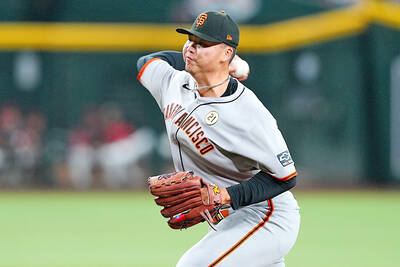
San Francisco Giants pitcher Teng Kai-wei impressed against the Arizona Diamondbacks on Monday despite an 8-1 loss in the opener of the team’s nine-game road trip. Teng, the only Taiwanese pitcher active in MLB, struck out five while allowing two hits and one walk over four innings at Chase Field to finish with a no decision, as the teams were tied 1-1 when he finished his outing. He surrendered the lone run of his outing in the bottom of the first, which began with a walk, a hit-by-pitch and two strikeouts. Diamondbacks leadoff hitter Geraldo Perdomo advanced to third on
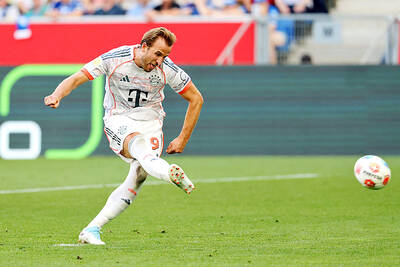
DOUBLE: Harry Kane has now netted 12 goals in six games, scoring his second hat-trick this season after Bayern’s opening Bundesliga match against Leipzig last month That man again. Harry Kane scored his second hat-trick of the season on Saturday to steer Bayern Munich to a 4-1 win at Hoffenheim for the best Bundesliga start any team has made after four rounds. The England captain scored before the break and converted two penalties after it to take his club tally to 12 goals in six games across all competitions — 13 goals in seven games including the German Supercup. Kane’s other hat-trick was in the Bundesliga-opening 6-0 rout of Leipzig. Bayern’s record of 12 points with a goal difference of 15-plus is the best after four rounds of the Bundesliga
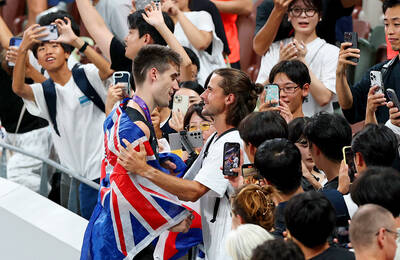
New Zealand yesterday basked in “amazing” athletics glory after winning two gold medals in as many days at the World Athletics Championships in Tokyo. Geordie Beamish on Monday claimed New Zealand’s first track gold in history with a shock victory in the 3,000m steeplechase, while high jumper Hamish Kerr followed with gold on Tuesday to make it an unprecedented double success for a country much better known for rugby than its prowess in track and field. Before this week, the country had won only six golds in total at the championships. Yesterday morning New Zealand were in the giddy position of fourth on
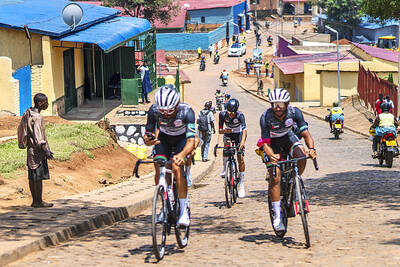
Rwanda is to take center stage from today as the first African country to host the cycling world championships, in its latest use of sports to improve the country’s reputation. As it prepares for 5,000 cyclists and 20,000 spectators, Rwanda has spruced up its roads, created a network of cycle lanes and run multiple police drills. A poor, landlocked country in east Africa still widely associated with a horrific genocide in 1994, Rwanda has used various sports to revamp its image, attract tourists and impress investors with its organizational efficiency. It has spent lavishly on soccer sponsorship deals with clubs